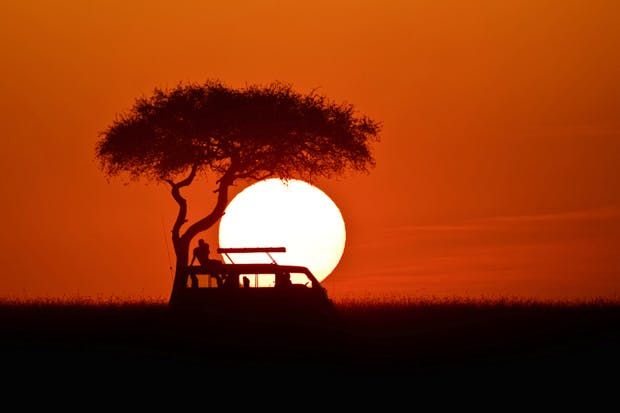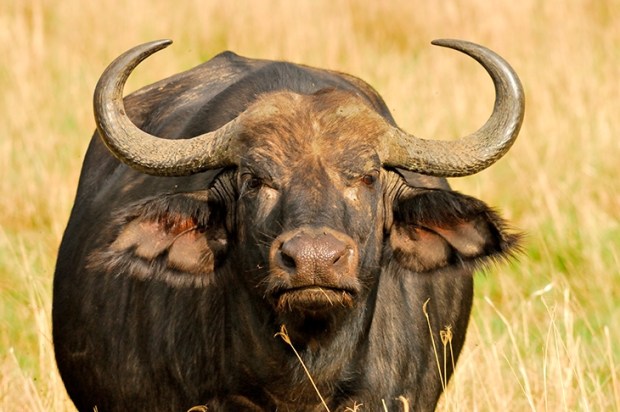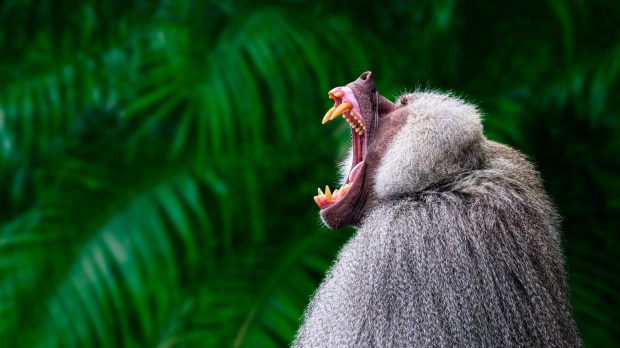Night falls like a fire curtain at seven and I go to bed not long afterwards, serenaded by bullfrogs after rain. Having risen long before dawn, ranchers tend to sleep early, following a thin gruel of a supper. In upcountry Kenya it used to be that pyjamas and dressing-gowns were permissible for even quite posh dinners. Once in a blue moon, one might keep a farmer awake with good whisky or rugby to watch. Sometimes, once an evening gets going, by night’s end there’s reeling and the light bulbs are being used for target practice. Not more than once or twice in a year, mind you, or this can crowd out a man.
Not an hour after I’ve shut my eyes I wake again. From below my window come vaguely Jurassic, subsonic rumbles. I stumble outside, to find the night askari Akope flashing his torch around. In the inky black, a tree is pushed over. I send up a flare, which illuminates a dozen elephant consuming my herbaceous borders. They canter off, demolishing a wide section of dry-stone wall.
Back in the house, the dogs are silent. The family are all away, at school or in other continents for work. I am getting to that point where I have started holding quite complex conversations with the dogs. ‘Cowards,’ I say now and get back into bed.
I doze off to the insect wall of sound. With a start I wake again and time has passed. I do not know what disturbed me but the insects have suddenly gone quiet. I wonder what makes them stop, what they are waiting for. Out here, many miles from the nearest road, there is no noise at all, only the rush of blood in my ears, and that faint, unceasing rumble of the earth turning that you hear in the bush.
I get up, dress in yesterday’s smoky clothes. Akope has vanished, probably sleeping on a sun lounger or in a wheelbarrow. I drive over to the cattle boma. The constellations are so clear and thick with light that I might climb into them. At the boma I am delighted to find the askari Leshomo and the stockman Apurra awake by the campfire. Somebody to talk to in the lonely night! We chat quietly about the cows, which are lying down and chewing the cud. Leshomo has set his bed up right in among the cattle.
A lion grunts in the valley. Apurra flashes his torch. Out across the plains, from miles away in Samburu or Pokot country, a light flashes in response. This sets off a sequence of other flashes from across the sparsely scattered bomas up to the horizon. It’s like a busy shipping lane, but silent. The cattlemen from all tribes are awake tonight in every camp, all the way to Ethiopia.
In our western culture we tend to take our sleep in one go, for eight hours if we can in our private places, and to remain awake for the rest of the day. Among the pastoralists and nomads, it’s different. People seem to nap several times in a full day, and they might be up at all hours of the night in camp, dozing by the fire and in turns chatting, guarding, singing, milking.
Sometimes we’ve heard gunfire in the distance — or nearby — and detonations on gusts of wind, the sounds of fighting swishing from one end of the valley to the other. But in the past two weeks it has rained and you can almost hear the grass growing. There is no trouble.
On the road there is an aardvark and two jackals, an African hare. Back at the house, the dogs are pleased to see me, so I take them outside for a wander and a pee, keeping a close eye on them in case of leopard. At last, it’s time to sleep. Instead I lie there worrying, about family members, unpaid bills, and the scar on my hand throbs. A zebra brays from the valley. At 4.30 a.m. sharp, I listen to the piston-engine aircraft that flies north at exactly this time every morning to some army base or oil-exploration camp in the desert.
I must have slept, it seems, but for only a few minutes — and I come to again hearing the pre-dawn bustards taking to the air, flying towards the very first colour in the sky. The zebra are going bonkers. Then the VHF radio crackles into life with Apurra summoning all hands to the crush for dipping day and I am up. The dogs tear out of the house looking for a klipspringer to chase or a tortoise to intimidate. The askari Akope has miraculously reappeared. I do not think I got much sleep at all!
Got something to add? Join the discussion and comment below.
Get 10 issues for just $10
Subscribe to The Spectator Australia today for the next 10 magazine issues, plus full online access, for just $10.















Comments
Don't miss out
Join the conversation with other Spectator Australia readers. Subscribe to leave a comment.
SUBSCRIBEAlready a subscriber? Log in